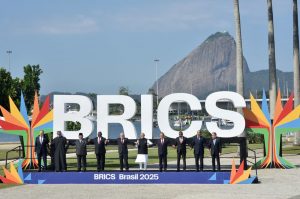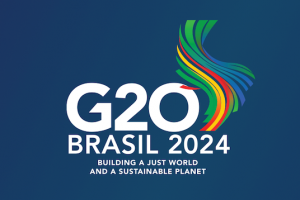
Well the BRICS+ Summit is over. Some thoughts on the just concluded Summit as well as reactions to continuing Trump tariffs.
So the BRICS+ wrapped up earlier in the week. And it’s fair to ask – so what? But before we get to that, it’s impossible to avoid the all too apparent craziness of the Trump tariffs. It appears that Trump has chosen to resort to letters to various trading partners announcing new tariffs, failing significant advances in so many tariff negotiations. As pointed out by Ishaan Tharoor the foreign affairs columnist and anchor of Today’s WorldView at WAPO:
“President Donald Trump threatened to impose tariffs of between 25 percent and 40 percent on imports from 14 countries, including Japan, South Korea, Thailand and Bangladesh, unless they address his concerns over perceived bilateral trade imbalances.”
After the Rio de Janeiro Declaration became public on Sunday, Trump turned his ire on at least the BRICS+ members. As Trump wrote at Truth Social:
““Any Country aligning themselves with the Anti-American policies of BRICS, will be charged an ADDITIONAL 10% Tariff. There will be no exceptions to this policy,””
Trump then repeated and widened his tariff threat the following day. As described by Anusha Rathi, Editorial Fellow at Foreign Policy:
“Trump on Tuesday also reiterated his threat to impose 10 percent tariffs on BRICS member nations, including Brazil, Russia, India, China, South Africa, and five other countries, accusing them of being “anti-American” and of trying to destroy the U.S. dollar. At the end of the BRICS summit in Rio de Janeiro over the weekend, Brazilian President Luiz Inácio Lula da Silva said the world doesn’t need an “emperor,” referring to Trump’s threat.””
Meanwhile, the Trump tariff demands roll on. As described at CNN by John Liu and Matt Egan:
“President Donald Trump said at least seven countries can expect tariff letters on Wednesday morning, as he ramped up pressure on nations to strike deals with the United States by saying his new August 1 deadline would not be extended.”
“The announcement came as Trump vowed to slap a 10% levy on imports from the BRICS group of emerging economies, revealed plans for a 50% tariff on copper imports and threatened a massive 200% import tax on pharmaceuticals, renewing uncertainty for the global economy and markets – which have already experienced months of volatility.”
““A minimum of seven” tariff notices will be sent out to American trade partners Wednesday morning, Trump said on Truth Social Tuesday, adding that “an additional number of countries” would receive letters in the afternoon. Commerce Secretary Howard Lutnick told CNBC earlier on Tuesday that 15 to 20 letters are expected to be sent over the next two days.””
At least today, Trump writes on Truth Social platform it will all happen by August 1st:
“Trump said on Tuesday that there will be no further extension of the deadline. “All money will be due and payable starting AUGUST 1, 2025 – No extensions will be granted,” he posted on Truth Social. That marked a shift in tone from his comments the previous day that the August 1 date was “firm” but also “not 100% firm.””
But then as we have seen in the past a deadline is not necessarily a deadline to Donald Trump.
Turning to the BRICS+ Informal, What are we to make of the gathering and the role the members see for this Informal? Its origins are as early as the G20 leaders summit. And as we noted in the earlier Substack Post, “Finding Success for the BRICS+” we have seen a significant enlargement of the Informal with at least 10 members, maybe 11 – it is unclear whether Saudi Arabia accepts membership, and now additionally, 10 partners.
Commenting on the Kazan Summit hosted by Russia in 2024, Alexandra Sitenko at IPS recently wrote:
“Last year’s BRICS summit in Kazan, Russia, was clearly aimed at demonstrating the growing political and economic influence of the group of states. This was evident, among other things, in the admission of new full members and the discussion about setting up alternative international payment and trading platforms.”
There was a view coming out of the Russian Kazan Summit, according to Christopher Sabitini at Chatham House, just prior to the BRICS+ that the leadership of BRICS+, namely China and Russia, that the significant expansion could serve to make it [the BRICS] anti-western:
“The risk was the body would be turned into an anti-American forum, doing the bidding of China and Russia. For many, the later 2024 BRICS summit in Kazan, hosted by Vladimir Putin, reinforced the perception that the bloc had become a platform to challenge the Western order – even as democratic Indonesia joined the group.”
Expectations for the Brazilian Summit were always somewhat guarded. Importantly, leaders from the two major powers, Russia and China had chosen to forego attendance this year in Brazil: Putin because of an outstanding international arrest warrant for Russian actions in the Ukraine conflict and China’s, Xi Jinping not so obviously though it was thought he’d met with President Luiz Inácio Lula da Silva of Brazil twice in the recent past.
The general conclusion from the gathering and the joint Declaration is that Lula was able to stay away largely from geopolitical issues. As my colleague Oliver Stuenkel, an Associate Professor at the School of International Relations at Fundação Getulio Vargas (FGV) in São Paulo, Brazil wrote in FP on the conclusion of the Summit:
“This year’s BRICS leaders’ summit was relatively subdued compared with recent meetings of the bloc, which underwent a rapid expansion and recently added several new members. But the event, held on Sunday and Monday in Rio de Janeiro, still managed to attract U.S. President Donald Trump’s ire.”
“In an attempt to avoid tariff threats from Trump, host Brazil emphasized issues such as economic development and climate rather than more contentious topics, such as the use of local currencies in intra-BRICS trade.””
“The 16,000-word summit declaration released on Sunday was in large part boilerplate. Just like previous BRICS documents, it contained a strong defense of multilateral institutions such as the United Nations and the International Monetary Fund. It detailed technical matters involving ties between people, bureaucracies, businesses, and civil society in BRICS member countries. The declaration also called for inclusive artificial intelligence governance that respects the regulatory needs and autonomy of the global south.”
“On Sunday night, however, Trump posted on Truth Social threatening an additional 10 percent tariff on any country “aligning themselves with the Anti-American policies of BRICS.” The brief post did not clarify whether the threat extended only to the bloc’s members or whether its partner countries should also be on notice. The statement was particularly alarming for those BRICS countries and partners, such as China, India, and Indonesia, attempting to negotiate trade deals with Washington ahead of July 9, Trump’s initial deadline for imposing sweeping tariffs. (The White House announced on Monday that it would delay implementing those tariffs until Aug. 1 to give countries more time to negotiate.)”
Even in the face of such ‘trash talk’ from Trump, Brazil went out of its way to tamp down the tension as noted again, in the FP piece by Oliver Stuenkel. Such an effort was evident in a statement from Celso Amorim, a Brazilian diplomat who served previously as Minister of Foreign Affairs and also Minister of Defence:
“Amorim immediately sought to de-escalate: Trump’s “threats only show the need for an organization like the BRICS, which has the capacity to react, to meet and reach conclusions. … [BRICS] didn’t threaten the U.S. with anything.” A South African trade ministry spokesperson told Reuters that the country was not anti-American and remained interested in negotiating a trade deal with the United States.”
Back to Alexandra Sitenko at IPS, she concludes:
“The summit in Rio shows that the group is more economically relevant and politically present than ever before. As a platform for the Global South, BRICS could contribute to a rethink of global governance in the medium term. In this regard, the Rio summit was a step towards a multipolar, non-confrontational world order.”
At the Brics Brasil, Maiva D’Auria, suggested that members remained committed to development:
“At the Summit, BRICS member countries reaffirmed their commitment to multilateralism and to defending international law, including the purposes and principles enshrined in the UN Charter. The document also calls for the increased participation of developing countries, particularly those in Africa, Latin America and the Caribbean, in global decision-making processes and structures.”
It might be; but it might not be given the diversity of views held by this expanded membership. One thing I can say though is to the extent the BRICS and now the BRICS+ club was, and is, committed to development there is less than meets the eye. While Lula celebrated the tenth anniversary of the New Development Bank (NDB) with the presence of Dilma Rousseff, former Brazilian President, and currently the President of the NDB
Again from Brics Brasil, Mayara Souto writes:
“Lula underscored the significance of the New Development Bank (NDB) in the international debate on reforming global financial institutions, a thematic priority under the BRICS Finance track. He remarked that “our Bank is not merely a major institution serving emerging economies; it stands as evidence that a reformed financial architecture and a more equitable development model are possible.””
“NDB’s commitment to allocate 40% of its funding to sustainable development projects is aligned with the Climate Financing Declaration to be adopted at the BRICS Summit.”
The goals are of course praiseworthy and raising funds for climate change financing and global development are critical but the members probably can’t escape the need for ‘first mover action’ by the members and partners themselves to show real commitment in the face of the ‘Days of Trump’.
Image Credit: Brics Brasil
This Post first appeared at Alan’s Newsletter: https://globalsummitryproject.substack.com/p/the-conclusion-of-the-brics-summit

 Who would think that the threat to the global order could emanate from global summitry leadership. But that appears to be a real possibility. Let me explain.
Who would think that the threat to the global order could emanate from global summitry leadership. But that appears to be a real possibility. Let me explain.